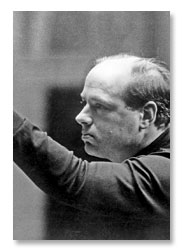
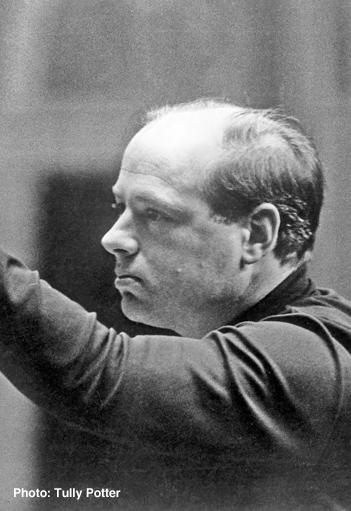
Bernard Haitink’s interest in music was first stimulated when as a child he was taken to hear a concert given by the Amsterdam Concertgebouw Orchestra under Willem Mengelberg. At the age of nine he started to have violin lessons, which he continued at the Amsterdam Conservatory, where he also studied conducting with Felix Hupka. He joined the Netherlands Radio Symphony Orchestra as a violinist but in 1954 and 1955 attended the annual courses for conductors organised by the Netherlands Radio Union, at which he studied with Ferdinand Leitner. This experience led directly to his appointment in 1955 as second conductor with the Union, sharing responsibility for four radio orchestras. Haitink first attracted attention when in 1956 he substituted for Carlo Maria Giulini in a performance of Cherubini’s Requiem with the Concertgebouw Orchestra, as a result of which he was invited to be a guest conductor at some of the orchestra’s regular concerts. Having become principal conductor of the Netherlands Radio Philharmonic Orchestra in the following year, he made his American debut in 1958, with the Los Angeles Philharmonic Orchestra, and first appeared in Britain in 1959, on a tour with the Concertgebouw Orchestra, with whom he made his first recording during the same year.
Following the unexpected death of the Concertgebouw Orchestra’s chief conductor Eduard van Beinum, also in 1959, Haitink and Eugen Jochum were appointed joint chief conductors of the orchestra in 1961. This arrangement lasted until 1963, when Haitink assumed full responsibility for the orchestra, also becoming a guest conductor with the London Philharmonic Orchestra. Appointed chief conductor of the LPO in 1967, between 1970 and 1979 he was in addition its artistic director. Haitink made his debut at the Glyndebourne Festival Opera in 1972, conducting Mozart’s Die Entführung aus dem Serail, and returned to lead Die Zauberflöte in 1973 and Stravinsky’s The Rake’s Progress in 1975. Two years later he succeeded Sir John Pritchard as the Festival’s chief conductor, a post that he retained until 1988. While at Glyndebourne Haitink conducted a repertoire that included Beethoven’s Fidelio, Richard Strauss’s Arabella, Prokofiev’s The Love for Three Oranges and Britten’s A Midsummer Night’s Dream, in addition to the principal Mozart operas.
Having first appeared with the Royal Opera Company at Covent Garden in 1977 conducting Don Giovanni, and at the Metropolitan Opera in 1982 with Fidelio, Haitink maintained his association with Covent Garden, conducting performances of Verdi’s Un ballo in maschera, Janáček’s Jenůfa and Wagner’s Lohengrin and Parsifal, and was appointed the company’s chief conductor in 1987. Although he suffered terribly during the traumas of the closure and rebuilding of the Royal Opera House between 1997 and 1999, arguably it was his principled stand that prevented the Covent Garden orchestra from being disbanded during this period. While in command at the Royal Opera, both before and after the closure, Haitink conducted memorable accounts of the major elements of the traditional operatic repertoire, such as Wagner’s Der Ring des Nibelungen, Die Meistersinger von Nürnberg and Tristan und Isolde, Verdi’s Don Carlo and Falstaff, Mozart’s Le nozze di Figaro, Borodin’s Prince Igor, Tchaikovsky’s The Queen of Spades and Britten’s Peter Grimes. He also took the orchestra out of the opera house and led it in several notable symphony concerts.
In addition to his operatic work in London, Haitink maintained an active concert schedule: as well as regularly appearing as a guest conductor with major orchestras such as the Berlin Philharmonic, London Symphony, and Vienna Philharmonic, between 1994 and 1999 he was chief conductor of the European Union Youth Orchestra, and in 1995 was appointed principal guest conductor of the Boston Symphony Orchestra. Haitink relinquished his post at Covent Garden in 2002, becoming chief conductor of the Dresden Staatskapelle and also honorary conductor of the Concertgebouw Orchestra – the first time that such a title had been awarded in the history of the orchestra. In 2006 he took up the newly-created post of principal conductor with the Chicago Symphony Orchestra. Among the many honours Haitink has received during his long career are an honorary knighthood in 1977, the Erasmus Prize in Holland in 1991, and the Order of the House of Orange-Nassau, conferred upon him by the Queen of The Netherlands for his achievements in the arts; in 2002 he was made a Companion of Honour by Her Majesty the Queen of England.
Haitink’s reserved exterior is deceptive when it comes to making music: in works with which he identifies deeply, such as the symphonies of Mahler, he is able to deliver performances of great power and passion; and he is without question one of the finest conductors of the symphonies of Bruckner, possessing complete command of their individual musical architecture. His recording career, particularly in its early days, coincided with the constant growth of the record industry during the 1960s and 1970s, and he is thus extremely well represented in the record catalogues, having made many records, initially for the Dutch company Philips, and subsequently for both Decca and for EMI. Several notable concert performances with the Orchestre National de Radio France have also been released on the French Naïve label.
From this substantial discography several cycles stand out: the complete Beethoven, Mendelssohn, Schumann, Brahms, Tchaikovsky, Bruckner and Mahler symphonies for Philips, the complete Shostakovich symphonies for Decca and the complete Elgar and Vaughan Williams symphonies for EMI, as well as numerous individual works and many concerto accompaniments. Haitink’s recorded operatic repertoire is equally wide-ranging, with again an emphasis upon many heavyweight works, such as the Mozart/da Ponte operas, Fidelio, Wagner’s Tannhäuser and Ring cycle, Richard Strauss’s Der Rosenkavalier and Daphne, and Debussy’s Pelléas et Mélisande. Haitink has been such a ubiquitous figure in European and American musical life that it has been easy to take him for granted; this is to do him a major injustice. As his extensive recorded repertoire demonstrates, he stands in the direct line of the great European conductors of earlier generations such as Richter, Nikisch, Weingartner and Mengelberg.
© Naxos Rights International Ltd. — David Patmore (A–Z of Conductors, Naxos 8.558087–90).
| Title | |
| BEETHOVEN, L. van: Fidelio (Zurich Opera, 2008) | |
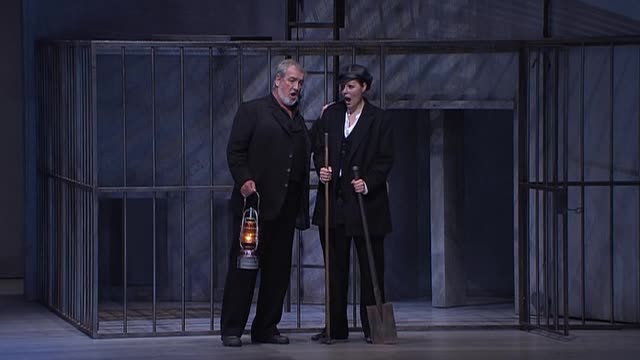
|
BEETHOVEN, L. van: Fidelio (Zurich Opera, 2008)
Composer:
Beethoven, Ludwig van
Artists:
Bidzinski, Boguslaw -- Diener, Melanie -- Gallo, Lucio -- Haitink, Bernard -- Moody, Morgan -- Muff, Alfred -- Sacca, Roberto -- Strazanac, Kresimir -- Strehl, Christoph -- Trattnigg, Sandra -- Zurich Opera House Chorus -- Zurich Opera House Orchestra
Label/Producer: Opus Arte |
| BRAHMS, J.: Piano Concerto No. 1 in D minor, Op. 15 (Rubinstein, Haitink) | |
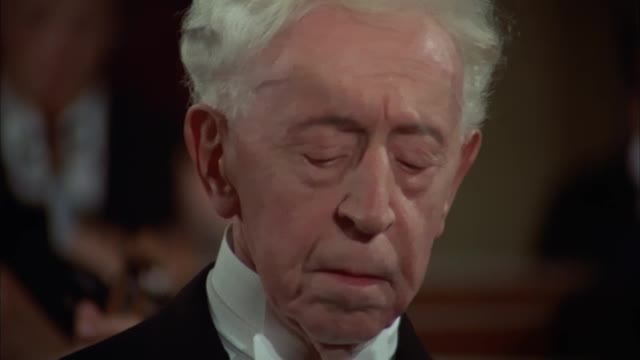
|
BRAHMS, J.: Piano Concerto No. 1 in D minor, Op. 15 (Rubinstein, Haitink)
Composer:
Brahms, Johannes
Artists:
Concertgebouw Orchestra -- Haitink, Bernard -- Rubinstein, Artur
Label/Producer: UNITEL |
| GOUD VOOR HAITINK, Part 1 - MAHLER, G.: Das Lied von der Erde (Larsson, Smith, Haitink) | |
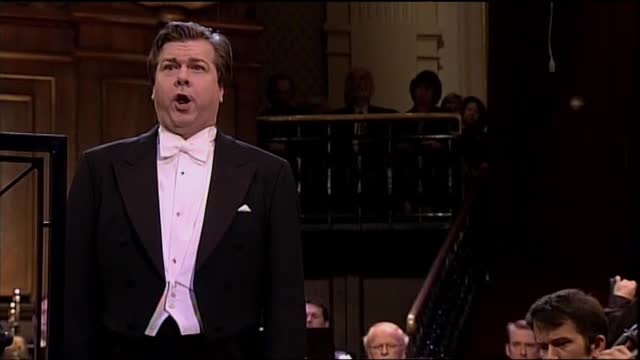
|
GOUD VOOR HAITINK, Part 1 - MAHLER, G.: Das Lied von der Erde (Larsson, Smith, Haitink)
Composer:
Mahler, Gustav
Artists:
Haitink, Bernard -- Larsson, Anna -- Royal Concertgebouw Orchestra -- Smith, Robert Dean
Label/Producer: C Major |
| HAITINK 80 JAAR, Part 2 - BEETHOVEN, L. van: Symphony No. 7 | |
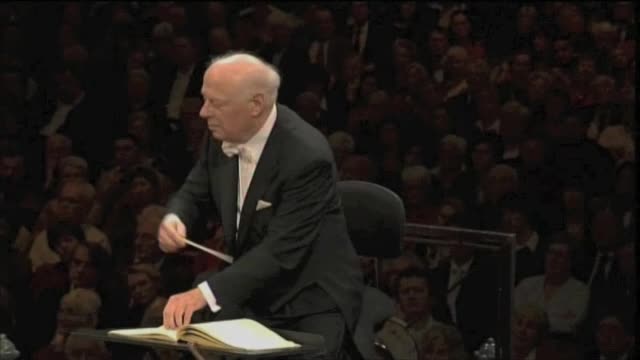
|
HAITINK 80 JAAR, Part 2 - BEETHOVEN, L. van: Symphony No. 7
Composer:
Beethoven, Ludwig van
Artists:
Haitink, Bernard -- Royal Concertgebouw Orchestra
Label/Producer: C Major |
| MAESTROS IN DEMOCRACY - The Berlin Philharmonic Elects Their Conductor | |

|
MAESTROS IN DEMOCRACY - The Berlin Philharmonic Elects Their Conductor
Artists:
Abbado, Claudio -- Barenboim, Daniel -- Berlin Philharmonic Orchestra -- Haitink, Bernard -- Maazel, Lorin -- Mehta, Zubin -- Rattle, Simon -- Salonen, Esa-Pekka
Label/Producer: EuroArts |
| MAHLER, G.: Symphonies Nos. 1-10 / Totenfeier / Das Lied von Der Erde (Royal Concertgebouw Orchtestra) | |
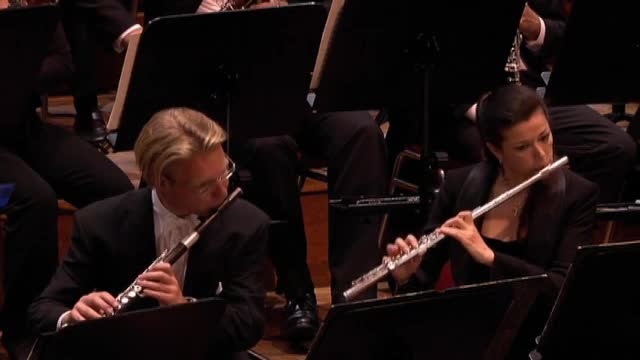
|
MAHLER, G.: Symphonies Nos. 1-10 / Totenfeier / Das Lied von Der Erde (Royal Concertgebouw Orchtestra)
Composer:
Mahler, Gustav
Artists:
Bavarian Radio Chorus -- Blythe, Stephanie -- Boulez, Pierre -- Brewer, Christine -- Espada, Maria -- Fink, Bernarda -- Fischer, Ivan -- Fujimura, Mihoko -- Gatti, Daniele -- Haitink, Bernard -- Hakala, Tommi -- Harding, Daniel -- Inbal, Eliahu -- Jansons, Mariss -- Kocan, Stefan -- Larsson, Anna -- Latvian State Choir -- Luisi, Fabio -- Maazel, Lorin -- Merbeth, Ricarda -- Netherlands Radio Choir -- Nylund, Camilla -- Persson, Miah -- Royal Concertgebouw Orchestra -- Smith, Robert Dean
Label/Producer: RCO Live |
| MAHLER, G.: Symphony No. 4 (Ewing, Royal Concertgebouw Orchestra, Haitink) | |
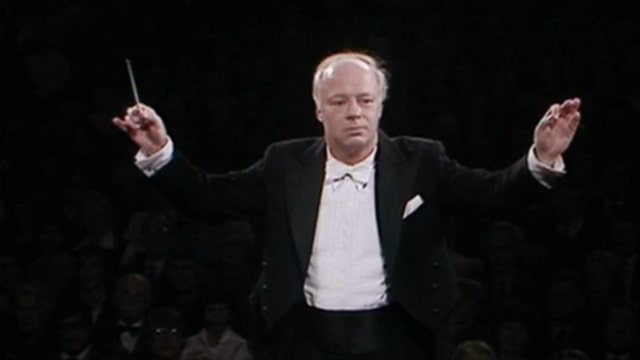
|
MAHLER, G.: Symphony No. 4 (Ewing, Royal Concertgebouw Orchestra, Haitink)
Composer:
Mahler, Gustav
Artists:
Ewing, Maria -- Haitink, Bernard -- Royal Concertgebouw Orchestra
Label/Producer: Monarda Music |
| MAHLER, G.: Symphony No. 9 in D Major (Haitink) | |
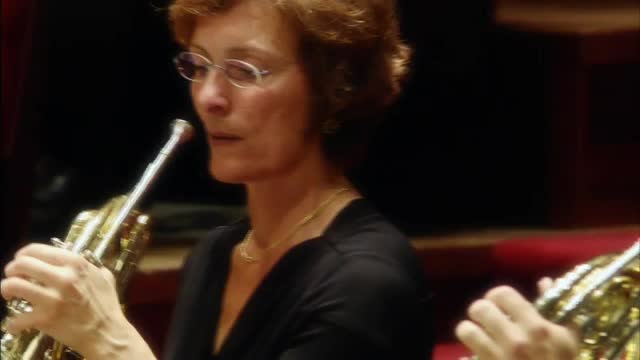
|
MAHLER, G.: Symphony No. 9 in D Major (Haitink)
Composer:
Mahler, Gustav
Artists:
Haitink, Bernard -- Royal Concertgebouw Orchestra
Label/Producer: C Major |
| MOZART, W.A.: Symphony No. 35, "Haffner" / DEBUSSY, C.: La Mer (Haitink) | |
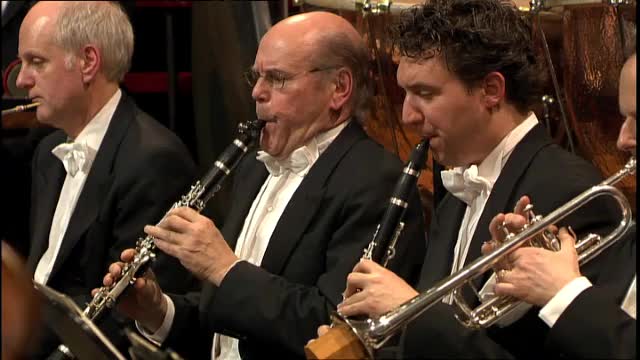
|
MOZART, W.A.: Symphony No. 35, "Haffner" / DEBUSSY, C.: La Mer (Haitink)
Composers:
Debussy, Claude -- Mozart, Wolfgang Amadeus
Artists:
Haitink, Bernard -- Royal Concertgebouw Orchestra
Label/Producer: C Major |
| VERDI: Falstaff (Royal Opera House, 1999) | |
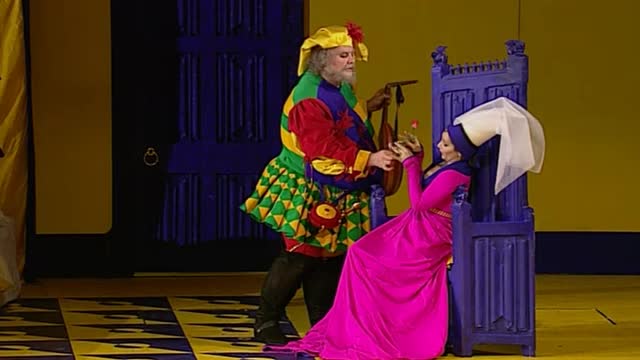
|
VERDI: Falstaff (Royal Opera House, 1999)
Composer:
Verdi, Giuseppe
Artists:
Frittoli, Barbara -- Frontali, Roberto -- Haitink, Bernard -- Hoare, Peter -- Howell, Gwynne -- Leggate, Robin -- Montague, Diana -- Nissa, Bernadette Manca di -- Rancatore, Desiree -- Royal Opera House Chorus, Covent Garden -- Royal Opera House Orchestra, Covent Garden -- Tarver, Kenneth -- Terfel, Bryn
Label/Producer: Opus Arte |
